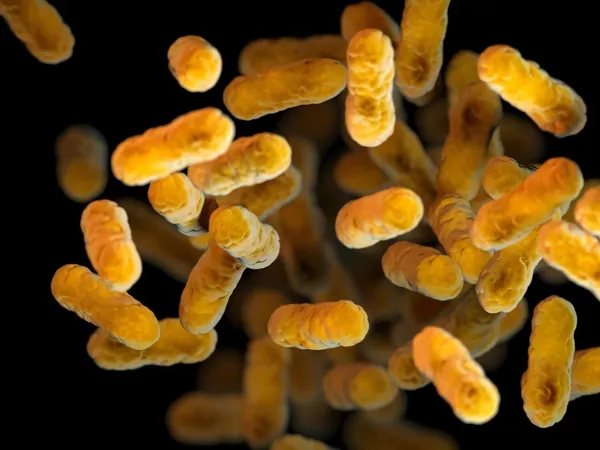
Breakthrough Research Uncovers Antibodies That Could Revolutionize Whooping Cough Vaccines!
2025-04-05
Author: Li
Whooping cough, also known as pertussis, was once considered a leading cause of childhood mortality in the U.S. and around the globe before vaccines were introduced in the 1940s. Over the years, the introduction of vaccines helped bring deaths down to a minimal count annually, almost eradicating the disease. However, the last few years have witnessed a worrying surge in whooping cough cases, primarily due to a decline in vaccination rates exacerbated by the COVID-19 pandemic. In 2024 alone, multiple outbreaks have caught public health officials off guard, leading to hospital backlogs as infants—who are most vulnerable—flood into emergency rooms exhibiting severe symptoms.
In an encouraging development, researchers at The University of Texas at Austin have made groundbreaking advancements that could enhance the efficacy of whooping cough vaccines and steer this infectious disease closer to eradication by addressing two fundamental weaknesses in the infection process.
Game-Changing Antibodies Unveiled
The research team, comprised of experts from UT's McKetta Department of Chemical Engineering and Department of Molecular Biosciences, has embarked on a crucial study published in the Proceedings of the National Academy of Sciences. This study spotlights two potent antibodies: hu11E6 and hu1B7, both of which uniquely neutralize the dangerous pertussis toxin (PT)—the culprit behind the disease's severe symptoms.
Using state-of-the-art cryo-electron microscopy, the researchers have successfully pinpointed the precise active sites, known as epitopes, on PT where these antibodies attach. The hu11E6 antibody ingeniously disrupts the toxin's ability to bind to human cells, while hu1B7 blocks its entry, preventing cellular damage. This is a landmark discovery, as it lays a comprehensive framework for future vaccine development.
Jennifer Maynard, a chemical engineering professor at UT's Cockrell School of Engineering, emphasized the potential to enhance current vaccines using these findings. "Several promising new pertussis vaccines are already in the research and clinical trial stages. Our work could integrate seamlessly into these innovations," she noted. Furthermore, emerging technologies, like mRNA platforms used in COVID-19 vaccines, could be adapted to create safer and more effective pertussis vaccines, harnessing these newly identified neutralizing epitopes.
Why Is Whooping Cough Still a Threat?
Pertussis, triggered by Bordetella pertussis bacteria, inflicts excruciatingly painful coughing spells, earning it the nickname "the 100-days cough." The respiratory illness can lead to severe complications, including pneumonia and seizures, particularly among infants. While immunization has significantly lowered incidence rates, modern vaccines' effectiveness diminishes over time, generally offering protection for only two to five years.
Recent trends are alarming: New York City reported a staggering 169% spike in whooping cough cases this fall, and Australia is experiencing its worst outbreak since the creation of the vaccine, with over 41,000 cases in 2024 alone. Public health officials attribute these outbreaks to missed vaccinations during the pandemic, highlighting the critical need for renewed efforts in vaccination campaigns.
Addressing Vaccine Hesitancy
Despite promising advancements in vaccine development, challenges remain. One significant barrier is vaccine hesitancy, particularly regarding maternal vaccination during pregnancy—a key method for protecting newborns until they can get vaccinated themselves. While the CDC notes over 90% vaccination in U.S. kindergarteners, only about 60% of mothers are vaccinated during pregnancy. This gap has created communities at risk and has contributed to the resurgence of preventable diseases.
Co-author and research professor Annalee W. Nguyen underscored the importance of prevention over treatment. "Vaccinating mothers during pregnancy has the potential to significantly shield their newborns from whooping cough," she stated.
The research team believes that by focusing on neutralizing epitopes and enhancing vaccine potency, they can not only improve vaccine uptake but also restore public confidence in immunizations against whooping cough, ultimately mitigating the threat of resurgence.
As the development of novel vaccines progresses, this promising research shines a light on a new approach to tackling whooping cough, potentially saving countless lives in the process. Will the world say goodbye to this deadly disease once and for all? Only time will tell!



 Brasil (PT)
Brasil (PT)
 Canada (EN)
Canada (EN)
 Chile (ES)
Chile (ES)
 Česko (CS)
Česko (CS)
 대한민국 (KO)
대한민국 (KO)
 España (ES)
España (ES)
 France (FR)
France (FR)
 Hong Kong (EN)
Hong Kong (EN)
 Italia (IT)
Italia (IT)
 日本 (JA)
日本 (JA)
 Magyarország (HU)
Magyarország (HU)
 Norge (NO)
Norge (NO)
 Polska (PL)
Polska (PL)
 Schweiz (DE)
Schweiz (DE)
 Singapore (EN)
Singapore (EN)
 Sverige (SV)
Sverige (SV)
 Suomi (FI)
Suomi (FI)
 Türkiye (TR)
Türkiye (TR)
 الإمارات العربية المتحدة (AR)
الإمارات العربية المتحدة (AR)